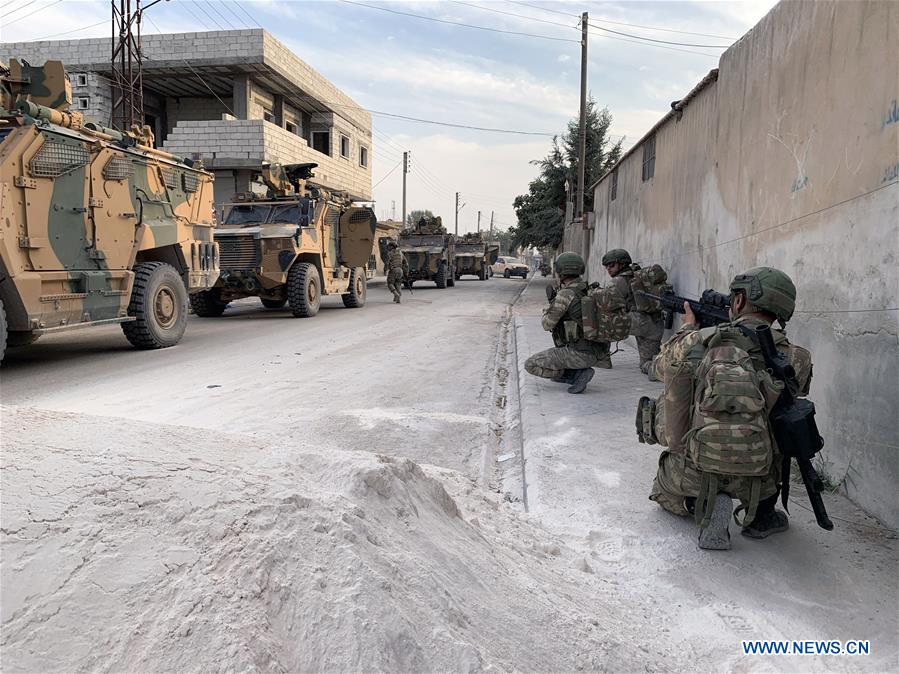Turkish-Kurdish-Syrian border conflict far from over
- By Sajjad Malik
 0 Comment(s)
0 Comment(s) Print
Print E-mail China.org.cn, October 22, 2019
E-mail China.org.cn, October 22, 2019

President Recep Tayyip Erdogan's gamble in the Syrian northeast has paid off. He challenged the world and everyone blinked. The result is obvious, as within a week, he has emerged the victor.
Operation Peace Spring, launched on October 9, aimed at pushing the Kurds away from the border in order to remove the threat of the People's Protection Units (YPG).
Turkey decided to use military force after Donald Trump, in an unprecedented move, abruptly pulled out American soldiers from the affected areas. In fact, Turkey was waiting for this and acted swiftly.
The war could have wreaked havoc had Trump not launched an important and timely diplomatic mission by sending Mike Pence and Mike Pompeo to give Erdogan whatever he wanted in exchange for a ceasefire. After their meeting, a five-day ceasefire was announced on October 17. Turkish and American officials worked out a 13-point agreement, which effectively served everything to Turkey on a platter.
This deal has made Turkey the undisputed master of northeastern Syria. It now had a security zone stretching 440 km from the Euphrates river to the Iraqi border, and 32 km deep into Syria. Kurdish forces are also required to withdraw from this border strip. The time for withdrawal is five days, 120 hours to be precise – which is also the duration of the ceasefire. Turkey warned that it will resume military operations if the Kurds fail to comply.
Turkey has planned to move about 3.6 million Syrian refugees living on its soil and settle them in the new security zone. Once settled, they would become an effective buffer against any intrusion by the Kurds.
The U.S. is not interested in physically enforcing the safe zone, but its forces would carry out aerial reconnaissance of the border areas to watch over prisons holding the militant Islamic State fighters. Reportedly, over 12,000 ISIS fighters and their family members are being held in jails and camps maintained by the Kurds. Following the recent developments, the control of some of them will now be in the hands of Turkey.
Turkey has won the first round. Its forces now have a foothold in Syria. The threat of U.S. sanctions has been averted, while the YPG fighters have pushed back. However, this is only the first bout in the complex Syrian conflict that has witnessed shifting loyalties and a tilting balance of power. Erdogan's victory will not end the scramble for supremacy in the area.
The issue of abandoning the Kurds is still being reviewed in the U.S. and Congress is clearly unhappy with the entire saga that began to unravel when Trump announced his decision to ditch the Kurds. Some lawmakers announced their support to impose economic sanctions on Turkey. Even Trump's own party is now questioning his Syria policy and his business-like style of "throwing away" the Kurds.
So far the Kurds have not shown their true intentions. They have been asked to move out of the border strip within the given time. Will they do so? Is it even possible for them, logistically? Even if they follow the deadline due to the heavy odds against them, will they just sit back and forgo their claim to return back to their homes?
The point is that the Kurds are not defeated. Their power is intact and they can easily come back to fight or even start clandestine activities. Though, Turkey's wish for a safe zone has been granted and its concerns about the Kurds acknowledged, future problems and challenges cannot be ruled out.
Sajjad Malik is a columnist with China.org.cn. For more information please visit:
http://www.keyanhelp.cn/opinion/SajjadMalik.htm
Opinion articles reflect the views of their authors, not necessarily those of China.org.cn.
If you would like to contribute, please contact us at opinion@china.org.cn.





